What to Do with Your Inherited Coin Collection
Your Ultimate Guide to Dealing with Inherited Coins

Aug 26th, 2022 · 10 min read
If you inherit a coin collection, you should leave the collection as is. Do not clean any of the coins, minimize contact with the coins, and get an appraisal to determine their value. From there, decide whether to keep or sell your inherited coins.
Inheriting a coin collection can, at first, seem overwhelming.
If you are unfamiliar with coin collecting, or different types of coins, you might not know how much individual coins can be worth or what to do with them.
You could see them and think that they are no different from any coin you have in a jacket pocket. Trust us, do not think like that. You might not realize your coin collection’s worth or what coin collectors would be willing to pay for a piece you have.
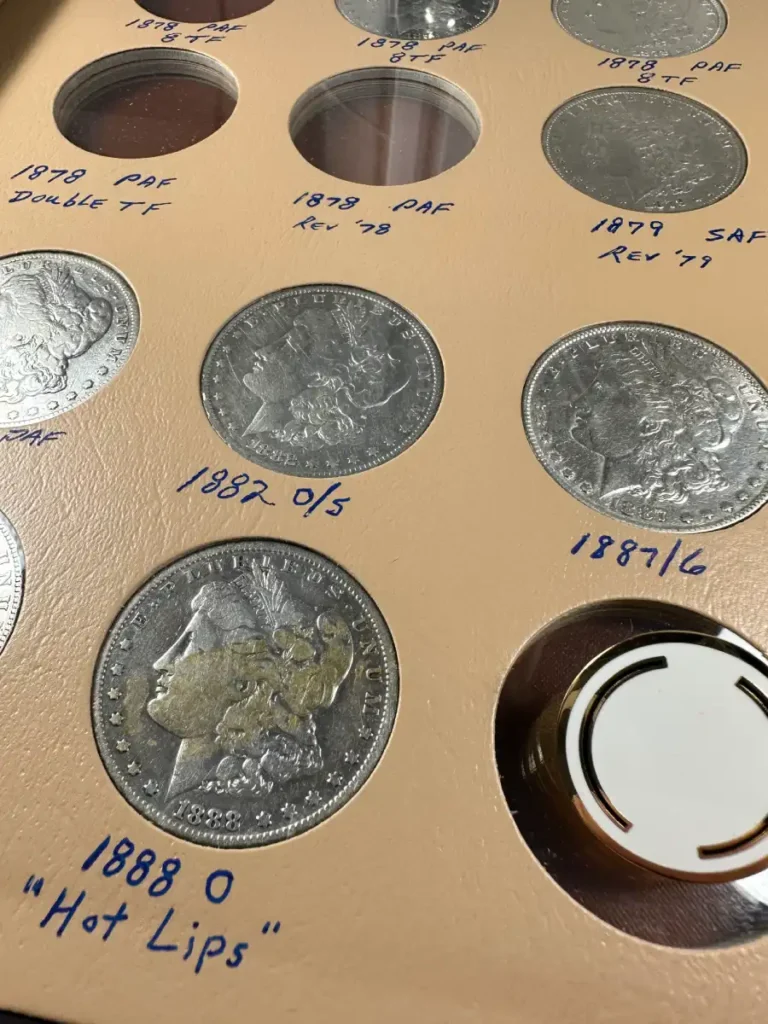
Or, maybe you are someone who has been collecting coins their whole life and has been to coin shows. But this is your first time being left a coin collection and you have questions.
Either way, let us help you.
In this article, we break down everything you need to know about inheriting a coin collection so you can make the best decision for your coins.
If you want an immediate appraisal to determine the value of your inherited collection, reach out to us here at Coinfully for a 100% free online coin appraisal. If you decide to sell a large collection, we will meet you in person at your convenience to handle the transaction.
You can also download our inherited coins guide to get even more insight into your collection.
Now let’s dive in.
Table of Contents
How To Handle Your Inherited Coin Collection
Before anything you should know how to handle your inherited coins. Whether you are thinking of keeping your coin collection or deciding to sell it, how you handle your United States coins will affect them.
Knowing the proper way to take care of your coins is important if inheriting a collection is your first time dealing with valuable coins.
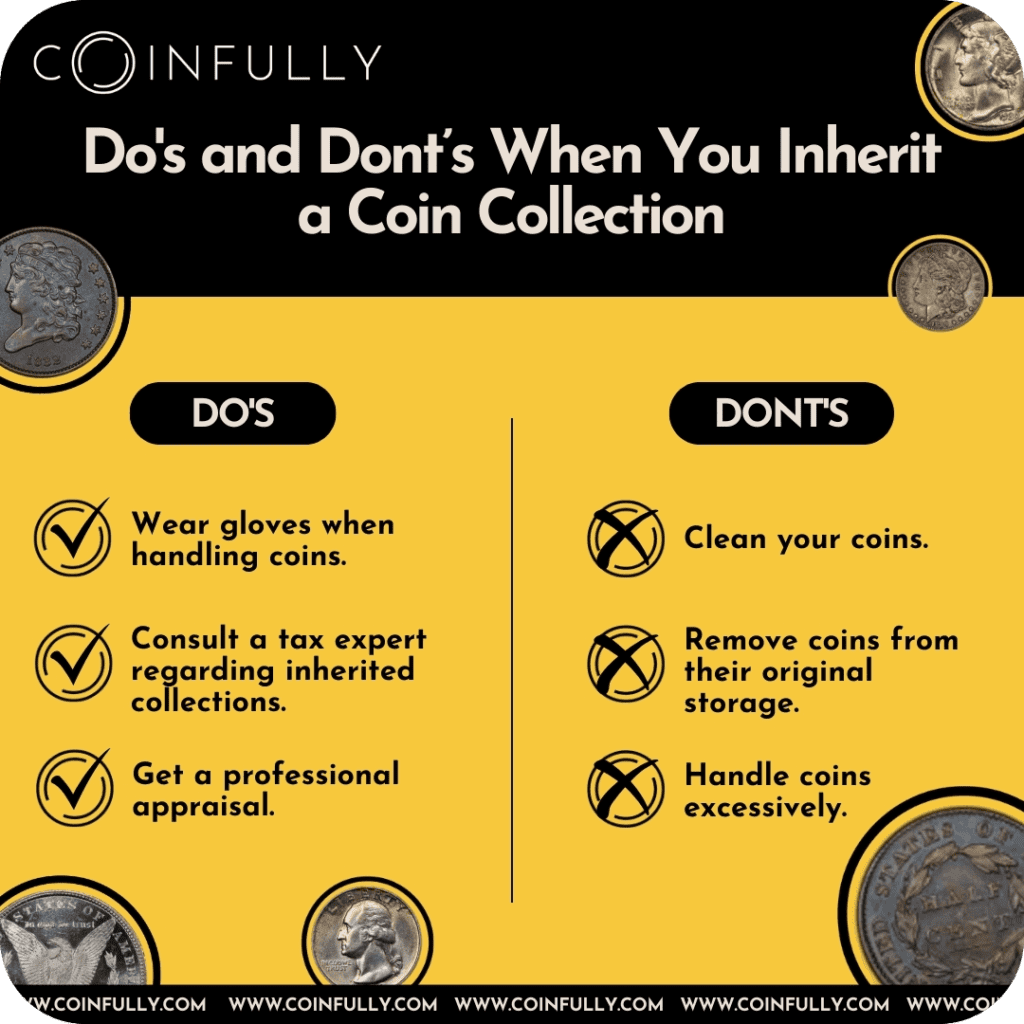
Should You Clean Your Inherited Coins?
No, do not clean your coins.
Whoever left you their coins did not clean them for a reason. Anything used to clean your coins could significantly hurt their worth whether you sell at auction houses or just compare price guides.
It is fine if your coins do not look like they are in perfect condition. Cleaning them can destroy what lies beneath a thin layer of dirt. Any dirt or grime is superficial and has a trivial impact on a coin. However, damaging a coin damages its value.
Keep Contact With Your Coins to a Minimum
If at all possible try to avoid touching your coins as much as you can.
If you do not know much about coins your first instinct might be to go through them all. Maybe flip a few just to see how they land. Do your best to fight this instinct. Your collection is not regular coins, those dimes could be worth significant money.
And anything on your hands can devalue or damage the coins.
This includes:
- Oils on your skin
- Chemicals from lotions or soaps
- Small bits of dirt or grime that you did not notice
If you do feel the need to hold or examine any loose coins you inherited, there are steps you can take to make sure your coins do not drop in value.
- Always remember to wear latex gloves
- Hold the coin on its edges, not its face
- Keep all coins above a soft surface to avoid any fall damage
Leave Your Inherited Coins How You Found Them
Chances are that whoever left you their coins was a collector and had them organized in some way.
If you have any graded coins they will be in a hard plastic container. Leave your coins in there. Trying to remove them can damage and seriously affect the sale price and grade of that coin.
If you get them in a binder or book, do not remove them. They will be fine until a coin expert can look through them safely and professionally.
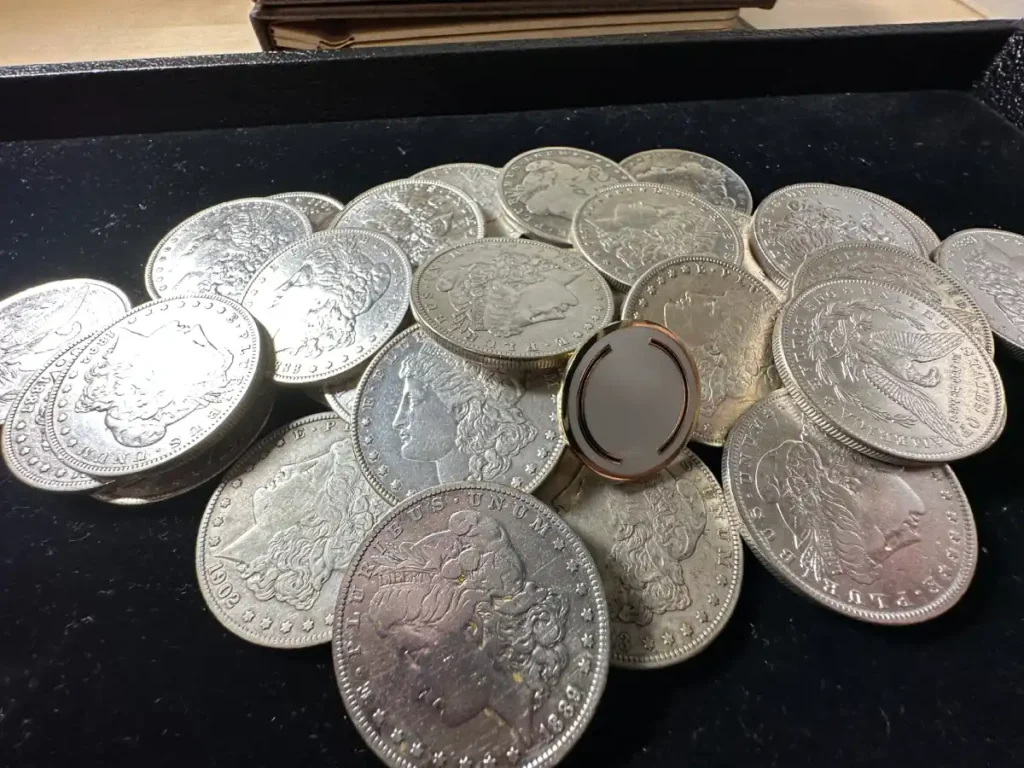
Even if the coins look like they might be damaged or dirty in whatever is holding them, do not take them out. You may have the best intentions when removing them, but even the slightest contact could affect your coins and their value more than leaving them.
What is Patina?
Some of your coins might have what looks to be a green or brown film over it, that is patina.
Patina happens to metals naturally over time with oxidization. It is why the Statue of Liberty is green and it is why your coin’s color has changed.
You might think that patina could ruin the value of your coin, but you would be wrong. Patina can help increase the price of your coins. Some collectors look for patina to help determine if a coin is real or fake.
Being over one hundred years old, some expensive Silver Morgan Dollar coins include a rainbowed patina that can add to the value.
Should I Be Concerned About Inheriting a Coin Collection and Taxes?
There should be no immediate tax concern when inheriting a coin collection. You only need to consider taxes on inherited coins if you plan to sell the coins.
If your coins are made of precious metals, you do not need to worry. Tax on inherited gold coins is no different from any other coin.
When inheriting coins you will not be taxed on any gains between the previous owner’s purchase and the time you received them.
If your coins were inherited as part of a larger estate it could be subject to an estate tax or state tax. It is smart to consult with a tax expert to learn about your inherited collection.
Though any taxes on coin collections can be reduced by the cost of appraisals or gradings on any coins.
Understanding silver dime collection values can significantly impact your decisions on whether to sell or keep your inheritance.
Should I Sell My Inherited Coin Collection?
The answer to this question is entirely up to you. No one can force you to sell your coins.
People without an interest in coin collecting tend to sell their inherited collections. Other people hold on to it as a way of connecting with past loved ones.
If you are on the fence, consulting with coin collection experts can provide insights and advice tailored to your specific situation and collection. They might be able to help you decide which pieces to keep and which to sell.
If you do decide to sell a dozen questions going through your head. You are wondering what your options for selling rare silver coins are and how to find buyers for your gold coins.
Don’t be fooled into believing that your coin’s value only lies in their precious metal. Yes, you are inheriting gold and silver, but the real value of your collection is in the history of the coins. Whether that history is personal to you and someone you cared about or a historical significance that adds value to your coins.
How To Tell If Coins Are Valuable?
If you aren’t familiar with coin collections your first instinct might be to Google the prices of your inherited coins. The number of results can be overwhelming alone, not to mention give you contradicting prices.
To fully know the value of your coins requires an understanding of market trends, rarity, and the historical significance of the pieces in your collection.
This is why we suggest always going to a professional for an appraisal.
Appraising Your Inherited Coins
Appraising your inherited coins before you decide what you want to do with your collection next, it is a smart idea to get your coin collection appraised.
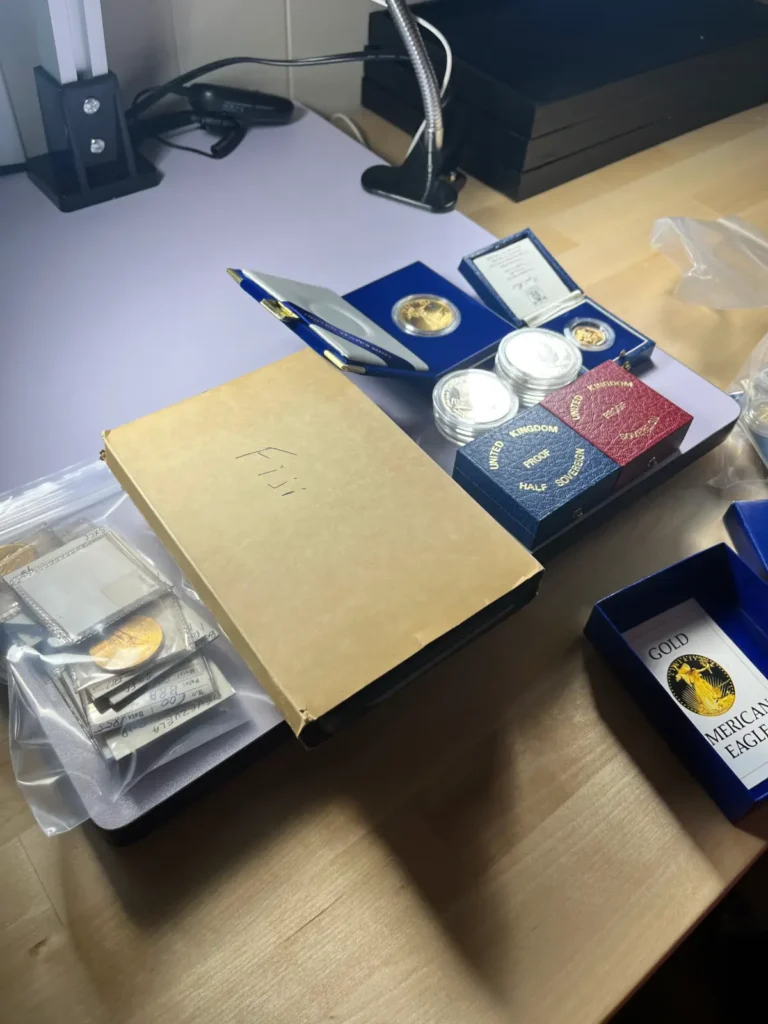
Knowing the value of your coin collection is important whether you are planning on selling or keeping them.
Why Do I Need An Appraisal?
You need to know the value of your inheritance.
Coin appraisals are useful when selling your inherited coins to make sure you are not selling them for pennies on the dollar. Someone thought of you when deciding who to leave their collection with, and you do not want to part with that for less than it is worth.
An appraisal is a smart idea if you are planning to sell any coins, but it is needed for tax reasons. The tax amount when selling your coins is based on their worth when you inherit them. As if whatever their price was when inherited was the price you bought them at. Making an appraisal necessary.
Even if you do not decide to ever sell the collection an appraisal is necessary. You will need an appraisal for insurance or maybe owning a collection is now piquing your interest in coins and you’d like to know more about them.
Where To Get An Appraisal?
You can get appraisals online or in-person
In addition to understanding the value of your collection, choosing the right platform for selling coins is critical for ensuring you receive the best possible return on your inheritance.
Taking your collection to anywhere that can buy or sell coins will normally be able to give you some kind of appraisal.
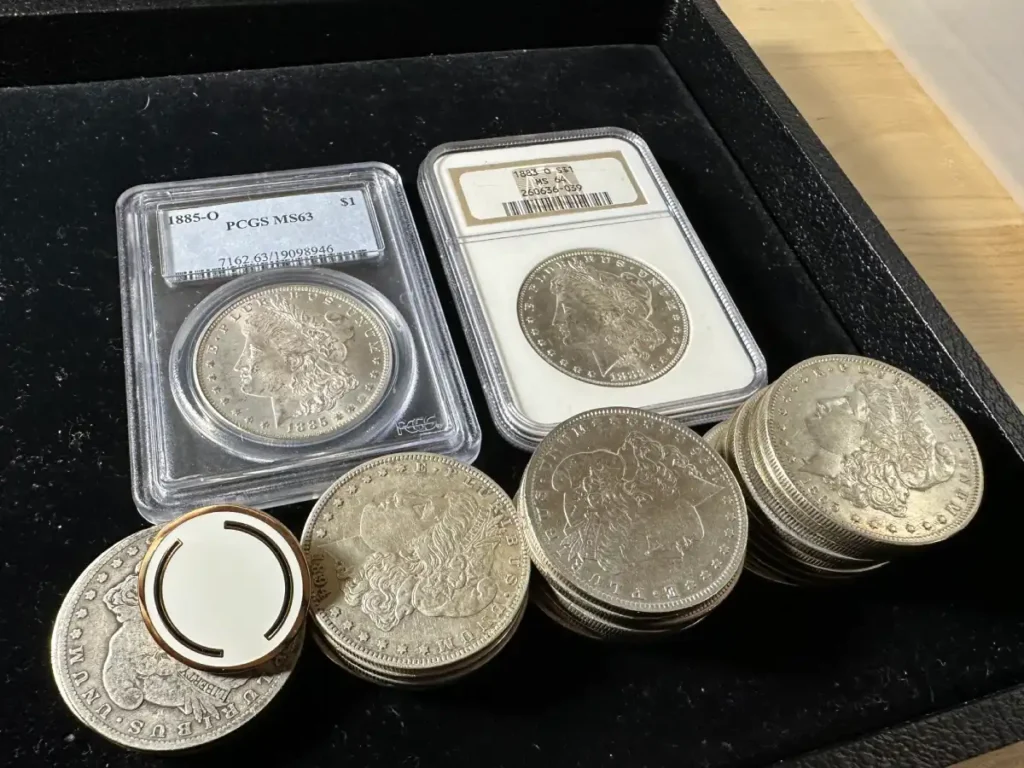
If you are unsure where to find a place near you like that, consider getting an appraisal from the comfort of your own home with an online appraisal.
The most important part of appraisals is making sure you have either an in-person or online coin appraisal expert valuing at your coins. Make sure anyone going through your inherited coins is acknowledged by the Professional Coin Grading Service or a similar organization.If you are still unsure on what to do next, feel free to reach out to us for an appraisal or to learn more about your inherited collection.

Wyatt McDonald President & Co-Founder of Coinfully. A student of numismatics and trained in the ANA Seminar in Denver, Wyatt is the face of Coinfully and a true expert. After spending a decade buying coins over the counter at a coin shop, he knew there had to be a better way, for everyone involved.
Get an Appraisal
Think you’re onto something big with your collection? Let’s talk…
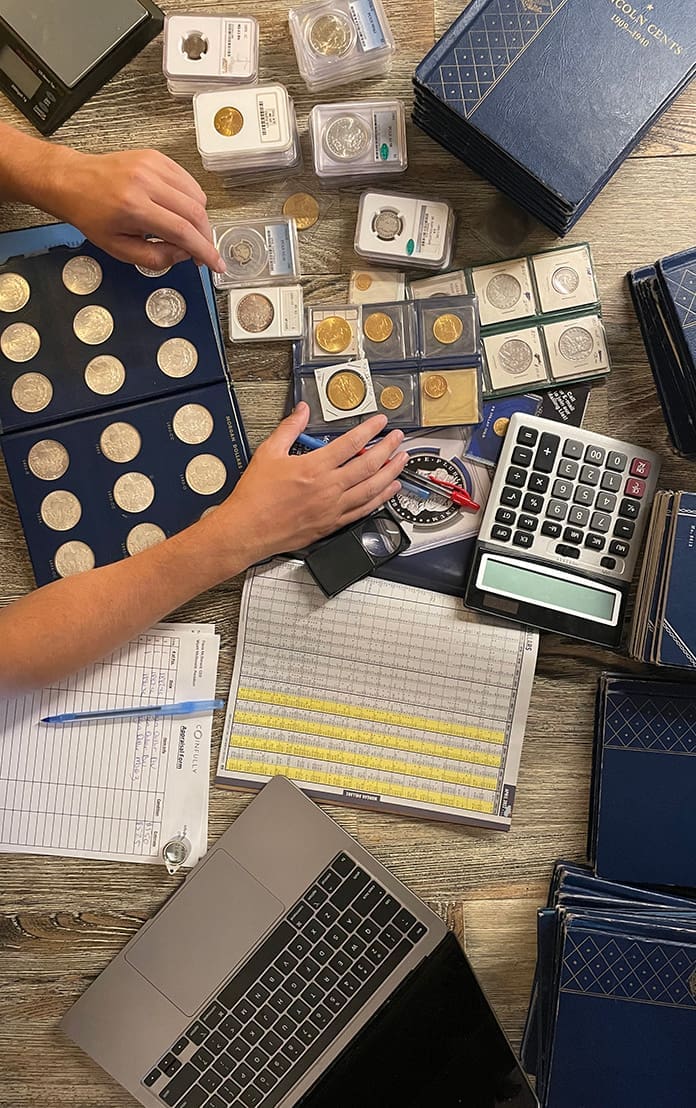

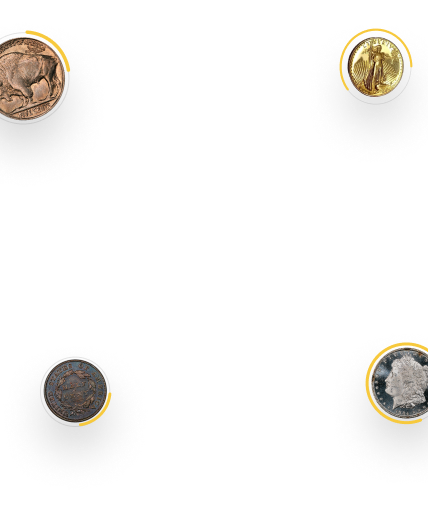


 401 Hawthorne Ln, Ste 110-323 - Charlotte, NC 28204
401 Hawthorne Ln, Ste 110-323 - Charlotte, NC 28204



